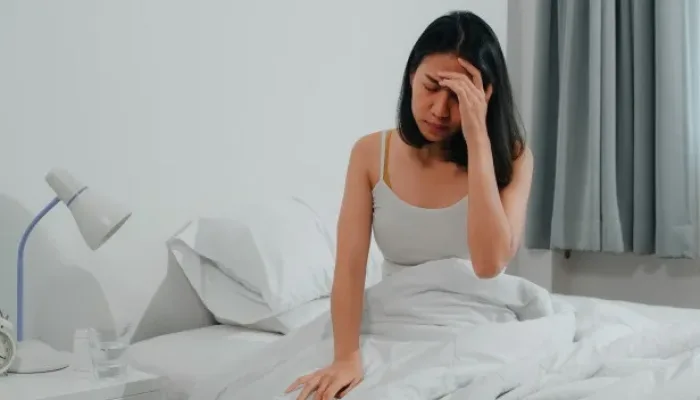- Home
- Insomnia
Insomnia
Insomnia
Insomnia is a frequent sleep disorder that makes falling asleep difficult, waking up without getting enough sleep, or having unrefreshing sleep. People’s sleep needs vary, and everyone experiences a night of restless sleep every now and then. Sleep problems affect over a quarter of the population, and they become more common as people get older.
The specific function of sleep is unknown, although the effects of sleep deprivation suggest that it serves to re-charge the body. Additionally, there are psychological advantages. Dreams usually happen during one phase of sleep (named the rapid eye movement or REM phase because the sleeper’s eyes can be seen moving rapidly behind the lids). People who do not get enough sleep or who sleep lightly are deprived of REM sleep. They may feel irritated and nervous, and in the case of severe sleep loss, they may even experience hallucinations. Their irritation as a result of their sleeplessness has an impact on their relationships, families, and coworkers. According to statistics, those who suffer from insomnia have a higher-than-average risk of dying from cancer, heart disease, or stroke.
Insomnia can be categorized into 3 types:
- Transient – only lasts a few days to a few weeks.
- Intermittent – occurs from time to time but not every night
- Chronic – occurs on a regular basis and lasts three weeks or longer.

Causes of Insomnia
In most cases, there is no single explanation for insomnia, however, several factors have proved to play a role:
- Lifestyle – eating late at night, jet lag, hunger, alcohol, caffeine, stimulant drugs, including nicotine.
- Environment – Noise (e.g., snoring from a partner), an uncomfortable bed or bedroom.
- Physical health issues – Sleep apnea, asthma, tinnitus, discomfort, prostate issues, and indigestion.
- Psychological factors – Stress, bereavement.
- Psychiatric factors – Depression, anxiety, and mania.
- Medication — Certain asthma pills and treatments for nasal congestion, vertigo, and depression.
Insomnia rarely occurs if none of the preceding factors is present. This is referred to as “primary” insomnia.
Symptoms of Insomnia
- Having trouble getting to sleep (taking more than 45 minutes to fall asleep).
- Having trouble staying sleeping (frequent awakenings and having difficulty getting back to sleep).
- Getting up early in the morning.
- Feeling fatigued and unrefreshed in the morning.
Treatment of Insomnia
Psychological therapies
Psychologists usually will guide patients to use some simple relaxation techniques. They also provide “talking therapy” (psychotherapy) to assist people to cope with numerous life situations that may provoke insomnia, such as bereavement, marital troubles, and so on. Psychological “tricks” can also be taught, such as telling you to attempt to stay awake, which has the opposite effect most of the time.
Cognitive behaviour therapy (CBT) is a type of sleep therapy that addresses misconceptions about sleep, such as the belief that taking many short naps during the day is beneficial.
Medication
Consult your doctor if daytime sleepiness is interfering with your work or leisure activities, or if you wake up feeling tired and irritable. Some doctors believe that prescription-only hypnotics should be started as soon as these issues arise, while others believe that sleep hygiene approaches should be tried first. Drugs should be used as brief as possible, and no longer than two weeks in any event. Aside from that, there’s a risk of developing a reliance (addiction) on sleeping pills. A general practitioner can also uncover any underlying causes of sleeplessness that require therapy. Antidepressants and sleeping medications may be used to treat depression. The following medications may be prescribed by your doctor:
Benzodiazepines
- Nitrazepam is a type of benzodiazepine drug which is powerful and effective, but it can become addictive with time. It works for several hours (medium-acting), which means it could cause hangover drowsiness the next morning.
- Temazepam and lormetazepam have a shorter-acting time and are less prone to cause sleepiness during the day.
All benzodiazepines can impair hand-eye coordination, making it difficult to drive or operate machinery the next day. Doctors are currently advised against prescription benzodiazepines for insomnia except for very short-term use in certain instances, such as in severely distraught persons, due to the possibility of addiction.
Other Medicines
Newer medicines, such as zopiclone (zimovane), zolpidem (Stilnox), and zaleplon (sonata), act quickly.
In principle, they should produce less daytime drowsiness and have a lower risk of addiction than benzodiazepines. However, there is little scientific research that compared the two categories. While the drug Zopiclone can leave a metallic taste on your tongue. These medications could also cause other negative side effects in addition to indigestion and headache.
Antidepressants – Some ‘tricyclic’ antidepressant drugs, such as dothiepin and trazodone, have a sedative effect if a person with insomnia suffers from depression. These medications will not cause addiction.
There are also a variety of over-the-counter medicines that may help with occasional insomnia.
Develop Healthy Habits
People suffering from insomnia can do a variety of things to alleviate symptoms on their own:
- Reduce the amount of coffee, tea, or cola drinks you consume during the day, especially later in the day.
- Alcohol should only be consumed in moderation. It may make you feel sleepy at first, but it will cause you to wake up after a short period of time.
- Stop smoking. It can make respiratory problems more likely when you’re sleeping.
- Regular exercise is recommended, although severe activity should be avoided right before bedtime.
- Establish a daily routine. Go to bed at the same time every night and wake up at the same time.
- Avoid large or rich meals in the hours leading up to the night.
- Over-stressing over sleeplessness can create a vicious cycle.
- If you can’t sleep, get up and read till you fall asleep in dim light. Don’t watch the TV or lie in bed pondering how little sleep you’re getting.
- Taking a warm bath, drinking a milky drink, or listening to calming music are some other things that might help you relax.
- Writing down any unfinished business for the next day can assist to erase them from the mind and avoid them from resurfacing in the early hours of the morning.

